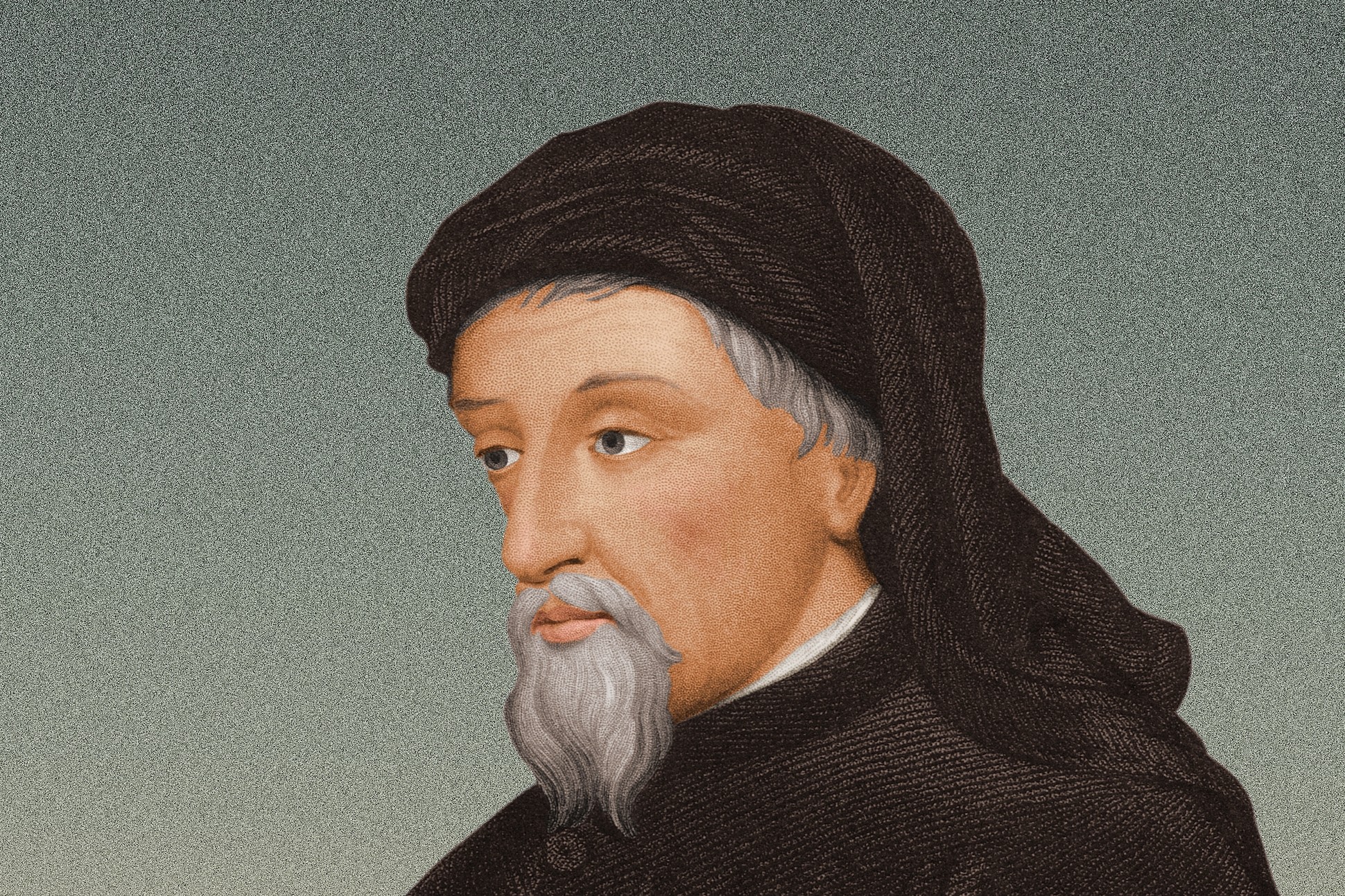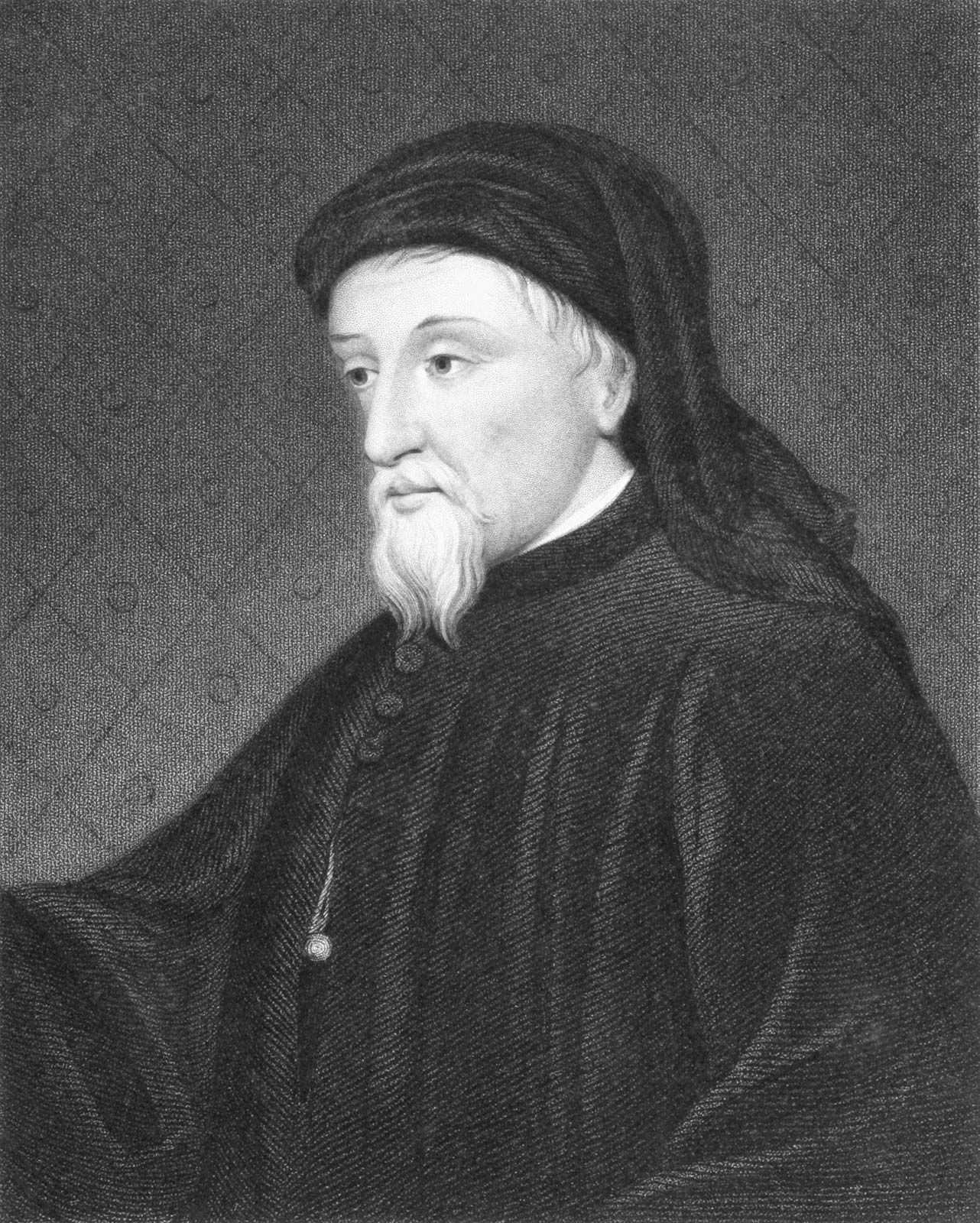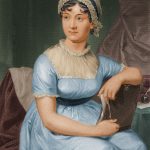Biography of Geoffrey Chaucer
Geoffrey Chaucer, born circa 1343, was an English poet and author. He’s famously known as the “Father of English literature.” Chaucer transformed the literary scene by writing in the vernacular English language during a time when Latin was the norm for literary expression. Among his notable works, “The Canterbury Tales”…
Geoffrey Chaucer, born circa 1343, was an English poet and author. He’s famously known as the “Father of English literature.”
Chaucer transformed the literary scene by writing in the vernacular English language during a time when Latin was the norm for literary expression. Among his notable works, “The Canterbury Tales” remains a cornerstone of English literature, celebrated for its vivid characters and insightful social commentary.
Chaucer’s career was diverse; he served as a courtier, diplomat, and civil servant under three monarchs, including Edward III and Richard II. His experiences exposed him to diverse societal aspects, enriching his writings with authenticity and depth. Chaucer’s pioneering use of Middle English paved the way for future literature and set a precedent for storytelling that resonates even centuries later.

Credit: www.poetryfoundation.org
Early Life And Education Of Chaucer
Take a journey back to the origins of a literary mastermind in the Early Life and Education of Geoffrey Chaucer. Uncover how his formative years shaped the voice of a generation. Dive into the tapestry of medieval England to explore the birthplace, childhood, and academic nurturing of the father of English literature.
Birth And Childhood
Geoffrey Chaucer was born into a world of change. 1343 is widely accepted as his birth year, in bustling London. Son to a prosperous wine merchant, he grew up near Thames Street. This placement at the heart of urban life exposed young Geoffrey to diverse cultures and languages, fueling his creativity.
- Year of Birth: circa 1343
- Location: London, England
- Family Trade: Wine Merchandise
- Urban Influences: Cultural diversity, languages
Early Education And Influences
Anchored in a world where few could read, Chaucer’s educational journey began. Details are scarce, but records suggest that he attended St Paul’s Cathedral School. There, the seeds of literature were sown amid the echoes of liturgical chants and scholarly discussion.
Chaucer’s diverse encounters further broadened his horizon. Tutors likely included priests who were well-versed in Latin. It was also during this time that courtly literature from France spilled into England, likely impacting young Geoffrey’s literary palate. The influence of early philosophers and poets helped forge Chaucer’s linguistic prowess.
| Chaucer’s Early Education | |
|---|---|
| Primary School | St Paul’s Cathedral School |
| Language Exposure | Latin, French, English |
| Key Influences | Priests, European literature, Court life |

Credit: www.scribd.com
Chaucer’s Introduction To Court Life
Geoffrey Chaucer’s journey into the swirling social milieu of English court life began with an array of roles. His wit, talent, and diplomatic skills earned him the regard of nobles and royalty alike. In this window into Chaucer’s life, we’ll explore how his service to the Crown intertwined with his personal life, shaping the man who would become the father of English literature.
Employment Under The Royalty
Chaucer’s courtly career took off in his teens. He served as a page to Elizabeth, Countess of Ulster, who was married to Lionel, Duke of Clarence. This role unearthed a world of opportunity for young Chaucer.
Precise attention to detail and his knack for language did not go unnoticed. Those skills soon landed him a position as a courtier, a diplomat, and also a spy.
His assignments spanned domestic and international realms, which included carrying royal messages across Europe and brokering peace deals. These diplomatic missions in France, Spain, and Italy expanded his worldview and enriched his literary acumen.
- Royal messenger to France and Italy.
- Negotiator for trade agreements.
- Involved in the marriage settlement of King Richard II.
Marriage And Personal Connections
Chaucer’s private life was no less interwoven with his royal service. He married Philippa Roet, a lady-in-waiting to Queen Philippa of Hainault. This marriage fortified Chaucer’s position within the court and deepened his connections to influential figures.
Philippa’s sister, Katherine Swynford, became the mistress and later wife of John of Gaunt, Duke of Lancaster and son of King Edward III. These family ties linked Chaucer to some of the most influential people in England.
| Connection | Impact |
|---|---|
| Marriage to Philippa Roet | Strengthened court standing |
| John of Gaunt’s patronage | Enhanced literary opportunities |
Chaucer’s astute marriage and personal connections formed a robust foundation for his craft and his contributions to English literature. His journey through court life was central in his becoming a notable voice of his time.
Military Service And Diplomacy
Geoffrey Chaucer’s life extended beyond poetry and literature. His early years included significant involvement in military campaigns and diplomatic services. Bold actions and astute negotiations colored his experiences. Chaucer’s life in military and diplomacy helped shape the vivid portrayals of his characters in his literary works. It offered him a wealth of insight into human nature and the workings of society.
The Hundred Years’ War Involvement
The Hundred Years’ War Involvement
Chaucer’s military service began with his participation in the Hundred Years’ War, a prolonged conflict between England and France. In 1359, young Chaucer enlisted as part of Edward III’s army. His role is not detailed extensively. Still, historical records reveal he was captured during the siege of Reims and thereafter ransomed by the king, indicative of his value to the crown.
Diplomatic Missions Abroad
Chaucer’s knack for languages and his sharp intellect propelled him into the realm of diplomacy. King Edward III recognized his talents and sent him on various diplomatic missions. Chaucer navigated complex negotiations with influential European powers. These missions included drafting treaties, scouting for potential alliances, and managing commercial interests.
- Italy in 1372: To establish an Anglo-Genoese trade agreement.
- France in 1377: For negotiations on the marriage of Richard II to a French princess.
- Spain in 1386: To discuss potential alliances against France.
These missions not only solidified Chaucer’s diplomatic prowess but also enriched his experiences. Such exposure was influential in the burgeoning literary career that followed his public service.
Cultural And Literary Influences
Geoffrey Chaucer, a monumental figure in English literature, drew inspiration from diverse cultural wells. His works reflect a rich tapestry of influences. We’re diving into the key ingredients that shaped his literary genius.
French And Italian Influences
In the cosmopolitan realms of medieval Europe, Chaucer found his muse across the English Channel. The French courtly love tradition deeply impacted his narrative style and themes. His early work, The Book of the Duchess, echoes this tradition.
Italy also left an indelible mark on Chaucer. His encounters with the works of Dante, Petrarch, and Boccaccio sparked a transformation in his storytelling. The Decameron by Boccaccio, for instance, parallels the structure of Chaucer’s most famous work, The Canterbury Tales. Chaucer’s travels to Italy likely facilitated this exchange of ideas. Italian realism and characterization techniques seeped into his writing, enriching his literary profile.
The Impact Of The English Society
The English social tapestry during Chaucer’s life was vibrant and complex. His experiences in English court and public service offered him a unique vantage point. His works, particularly The Canterbury Tales, mirror the societal hierarchy of his time. The interactions between pilgrims draw a vivid picture of English culture. Peasants, merchants, knights, and clerics, all come alive in his prose.
England’s transformative events, such as the Peasants’ Revolt of 1381 and the Hundred Years’ War, also influenced Chaucer’s perspectives. Social commentary became a subtle thread in his stories. The use of the English vernacular, rather than Latin or French, showed a bold move towards embracing and shaping an English identity. This laid the groundwork for the English literary tradition.
The Canterbury Tales: Magnum Opus
The Canterbury Tales: Magnum Opus stands as Geoffrey Chaucer’s most acclaimed work. This collection of 24 stories penned in Middle English paints a vibrant panorama of medieval society. The unmatched narrative depth and diversity enshrined Chaucer as the father of English literature.
Conception And Structure
The Canterbury Tales emerged from Chaucer’s bold vision. Picture a group of pilgrims, each from a unique walk of life, journeying together to Canterbury Cathedral. They share stories to pass time, with a free meal as a prize for the best tale. This clever framework gives birth to rich storytelling, intertwining various themes and genres.
- 24 tales, each distinct in style
- A prologue introducing pilgrims and contest
- Blend of narratives: knightly quests, moral fables, and more
Themes And Characters
The stories surpass mere entertainment, delving into the human condition. Chaucer’s characters represent a cross-section of 14th-century English society. This allows for a dissection of themes universal and timeless.
| Theme | Characters Illustrating Theme |
|---|---|
| Lust, Love, and Romance | The Knight, The Wife of Bath |
| Religious Hypocrisy | The Pardoner, The Friar |
| Social Class and Hierarchy | The Merchant, The Miller |
| Loyalty and Betrayal | The Squire, The Reeve |
Characters deliver enjoyable narratives that still resonate today. From the chivalrous Knight to the bawdy Wife of Bath, they diversify the themes across their stories. Morality plays against humor, piety against pragmatism, creating a tapestry that has stood the test of time.
Other Notable Works
While Geoffrey Chaucer is best known for his masterpiece, “The Canterbury Tales,” his genius spills over into numerous other works that have cemented his reputation as the father of English literature. An exploration of Chaucer’s early poetry and philosophical works, as well as his prose and translation endeavors, reveals an author versatile in both theme and expression. Let’s take a closer look at these remarkable contributions.
Early Poetry And Philosophical Works
Chaucer’s early poetry showcases his finesse in harnessing the power of words to weave intricate tales.
- “The Book of the Duchess”: A poignant elegy for John of Gaunt’s wife.
- “Anelida and Arcite”: A story of love and betrayal.
- “The House of Fame”: An exploration of celebrity and renown.
- “Parliament of Fowls”: A dream vision reflecting on love and social order.
- “The Legend of Good Women”: A series of narratives honoring women renowned for their loyalty.
His philosophical musings shine particularly in “The House of Fame” where the complex themes of fame and its impact on identity are explored.
Prose And Translation Pieces
Chaucer was also a master translator and prose writer.
His prose works, rich in both wisdom and wit, offered insights into the dynamics of society and human behavior.
- “Treatise on the Astrolabe”: A scientific text written for his son, explaining the workings of an astrolabe.
- “Boece”: The translation of Boethius’s “Consolation of Philosophy” into English prose.
Chaucer’s translations not only made philosophical concepts accessible but also enriched the English language.
Honing his talents in prose, Chaucer’s translation works were instrumental in shaping the vernacular of the era. “Boece” served as an important conduit through which the Italian Renaissance’s philosophies penetrated the English-speaking world.
Chaucer’s Legacy In English Literature
Geoffrey Chaucer left a mark on English literature that still shines today. His works are vital to understanding the evolution of the English language and literary form. Let’s explore how Chaucer’s writing became a cornerstone of English literature.
The Father Of English Poetry
Geoffrey Chaucer is often called the Father of English Poetry for good reason. Before Chaucer, French and Latin were the dominant literary languages. Chaucer chose to write in English, paving the way for future writers.
- Composed the famous “The Canterbury Tales”
- Introduced iambic pentameter, a staple in English poetry
- Vernacular storytelling made English literature accessible
Influence On Later Writers And The English Language
Chaucer’s impact stretches beyond his lifetime. His use of everyday language made books something everyone could enjoy. This shift influenced how writers approached their work.
| Writer | Influence |
|---|---|
| William Shakespeare | Adopted Chaucer’s storytelling and language techniques |
| Edmund Spenser | Drew inspiration from Chaucer’s poetic style |
Chaucer’s legacy extends to the English language itself. He invented and popularized new words and phrases. Many of these are still in use today.
- Coining of words like “lonely” and “femininity”
- Phrases like “all that glitters is not gold”
Historical And Modern Perspectives On Chaucer
Geoffrey Chaucer stands as a colossal figure in English literature.
His works bridge medieval stories and modern literary sensibilities.
Appreciation of his writing has evolved over time, with each era reshaping its understanding of his contributions to literature and culture.
Explore how different periods have viewed and interpreted Chaucer’s life and writing below.
Contemporary Views And Criticism
In his own time, Chaucer gained renown as a foremost poet.
Regarded by contemporaries as the father of English poetry, he was praised for his innovation.
- Inventive use of the English language over Latin or French
- Insights into medieval society through a vivid portrayal of characters
- Blending of humor, irony, and moral lessons
His peers noted his skilled narrative techniques and depth of knowledge.
Modern Scholarship And Interpretations
Today, scholars view Chaucer in a new light, with a focus on his literary artistry and its social impact.
Scholarly debates highlight gender roles and class dynamics within his works.
- Exploration of medieval English identity in a changing world
- Assessment of sociopolitical commentary through Chaucer’s lens
- Examination of his narrative structures and their influence on modern storytelling
Interpretations of his texts now engage with a broader historical context, uncovering layers of meaning.

Credit: www.worldhistory.org
Conclusion
Reflecting on Geoffrey Chaucer’s life, we are transported to a medieval era rich in literary prowess. His works, notably ‘The Canterbury Tales’, remain pivotal in English literature. Chaucer’s influence extends beyond his time, affirming his title as the Father of English literature.
His legacy, embedded in poetic verses and tales, continues to inspire and educate, cementing his indelible mark on the world of words and storytelling.






